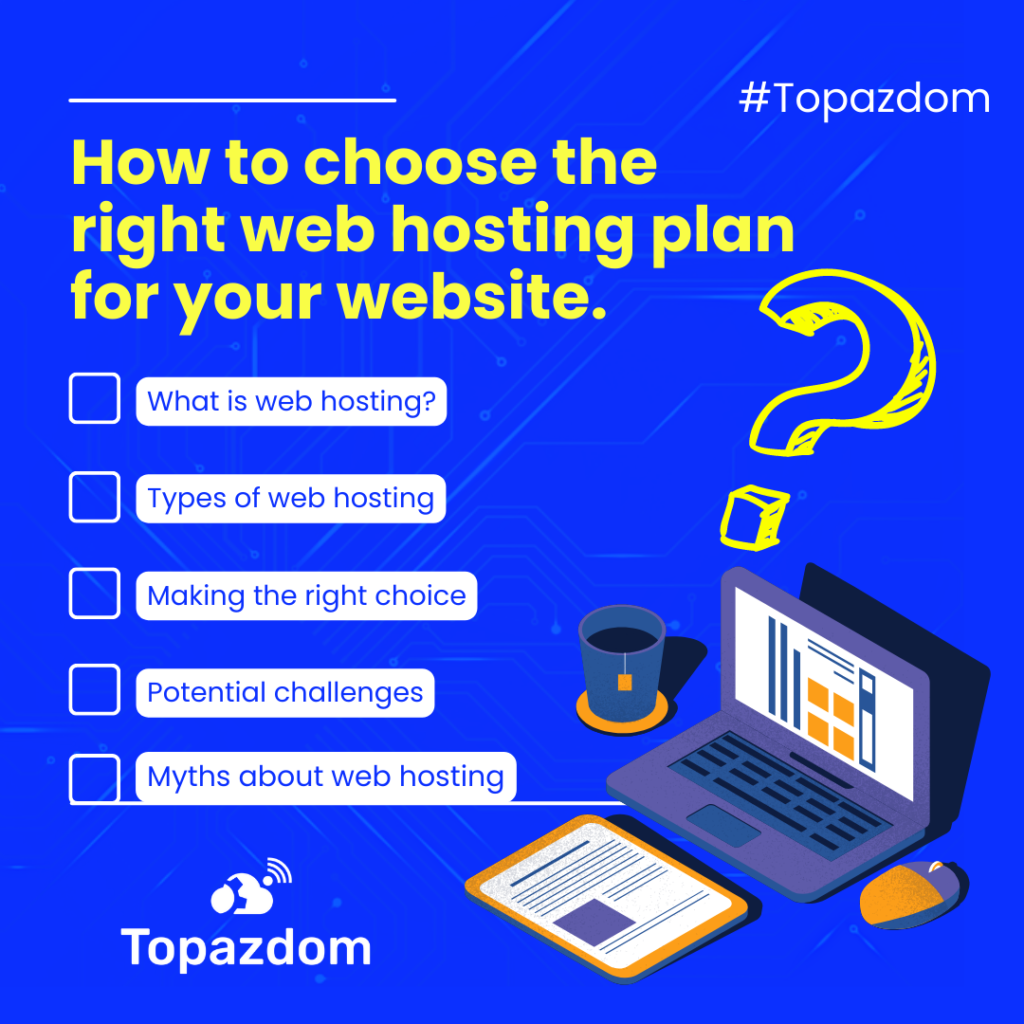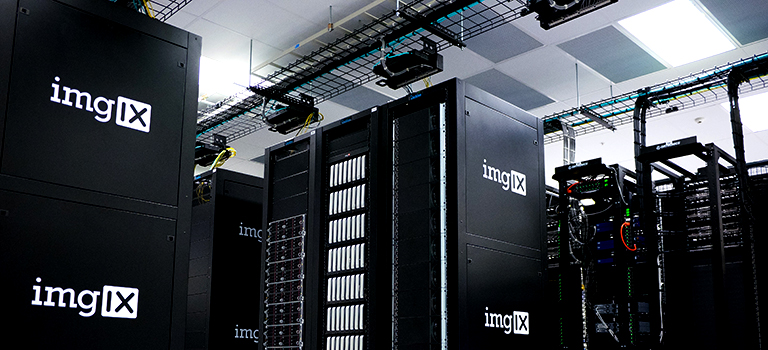
Introduction
In today’s digital landscape, having a strong online presence is crucial for businesses and individuals alike. One of the fundamental elements that power websites is web hosting. Whether you’re a seasoned web developer or a newbie in the online world, understanding what web hosting is and its importance can significantly impact your website’s performance and success. In this article, we will provide a comprehensive introduction to web hosting and highlight ten key important factors that make it an essential component of any online venture.
What is Web Hosting?
Web hosting is a service that enables individuals and businesses to publish their websites on the internet. It involves storing website files, databases, and other related components on specialised computers called servers. These servers are equipped with high-speed internet connections, allowing them to respond to user requests and deliver website content seamlessly.
Benefits/importance of web hosting.
1)Reliability and Uptime: Web hosting ensures that your website is accessible to visitors around the clock. A reliable web host minimises downtime and ensures that your site remains online, allowing your audience to access it whenever they need information or services.
2)Improved Website Speed: Web hosting plays a crucial role in determining your website’s loading speed. A fast-loading site enhances user experience and helps with search engine optimization (SEO) efforts, as search engines prioritise websites that offer better user experiences.
3)Enhanced Security: Web hosting providers offer various security measures to protect your website from cyber threats. These include firewalls, malware scanning, regular backups, and SSL certificates to encrypt data transmission. Choosing a reputable web host ensures that your website and visitors’ data remain safe and secure.
4)Scalability and Flexibility: As your website grows, you may need to accommodate increased traffic and data storage requirements. A reliable web hosting service offers scalability options that allow you to expand your resources and adapt to changing needs seamlessly.
5)Technical Support: Web hosting providers offer technical support to troubleshoot any issues you may encounter with your website. Having a reliable support team available 24/7 ensures that any problems are addressed promptly, minimising downtime and keeping your website running smoothly.
6)Email Management: Web hosting often includes email hosting services, allowing you to create professional email addresses using your domain name (e.g., yourname@yourwebsite.com). This strengthens your brand identity and helps you establish credibility in communication with clients, customers, or website visitors.
7)SEO Benefits: Web hosting indirectly affects your website’s search engine ranking. Factors such as website speed, uptime, and security provided by your web host can positively impact your SEO efforts, helping your website rank higher in search engine results and attract more organic traffic.
8)Control and Customization: With web hosting, you have complete control over your website’s content, design, and functionality. Unlike free website hosting platforms, web hosting allows you to customise your site according to your specific requirements and branding needs.
9)Data Management: Web hosting services typically provide robust data management tools, such as databases and file transfer protocols (FTP). These tools enable you to efficiently manage and organise your website’s data, making it easier to update and maintain your site.
10)Professional Image and Credibility:
Having a self-hosted website with a custom domain name creates a professional image for your business or personal brand. It instills trust and credibility in your visitors, as it demonstrates that you are committed to your online presence and have invested in a reliable hosting solution.
Web hosting is a vital component of any successful online venture. It ensures your website’s accessibility, security, speed, scalability, and provides essential support and tools for effective website management. By understanding the importance of web hosting, you can make informed decisions when selecting a reliable hosting provider that meets your specific needs. Invest in a reputable web host, and unlock the full potential of your website, contributing to your online success.
Types of web hosting
There are several types of web hosting available, each offering different features and catering to different needs. Here are some of the common types of web hosting:
1)Shared Hosting: This is the most basic and affordable type of hosting. In shared hosting, multiple websites share the resources of a single server. It’s a cost-effective option for small websites with low to moderate traffic.
2)Virtual Private Server (VPS) Hosting: VPS hosting involves partitioning a physical server into multiple virtual servers, providing each website with its own dedicated resources. It offers better performance and scalability compared to shared hosting, and it’s suitable for websites with medium traffic.
3)Dedicated Server Hosting: With dedicated server hosting, you have an entire physical server dedicated to your website. This provides maximum performance, flexibility, and control. Dedicated hosting is suitable for large websites with high traffic or specific technical requirements.
4)Cloud Hosting: Cloud hosting utilises multiple servers working together as a single system. It offers scalability, as resources can be easily added or removed based on demand. Cloud hosting is suitable for websites with fluctuating traffic or those needing high availability.
5)Managed WordPress Hosting: This type of hosting is optimised specifically for WordPress websites. It includes features like automatic updates, enhanced security, and specialised support. Managed WordPress hosting is ideal for WordPress users who want a hassle-free hosting experience.
6)Reseller Hosting: Reseller hosting allows you to sell hosting services to your clients. You purchase hosting resources from a provider and allocate them to individual clients as per their requirements. It’s suitable for individuals or businesses looking to start their own web hosting company.
7)Colocation Hosting: Colocation hosting involves housing your own server hardware in a data centre provided by a hosting company. The hosting provider offers the infrastructure, power, cooling, and security, while you retain full control over the server configuration. It’s suitable for businesses with specific hardware requirements or those seeking complete control.
8)Managed Hosting: Managed hosting is a type of hosting where the hosting provider takes care of server management tasks, including security patches, software updates, backups, and monitoring. It allows website owners to focus on their content and business aspects rather than server administration.
These are some of the common types of web hosting available in the market. Choosing the right type depends on your website’s requirements, budget, and expected traffic levels.
How to choose the right web hosting plan for your website
Selecting the right web hosting plan is a crucial decision that can greatly impact your website’s performance and success. With a plethora of options available, it can be overwhelming to determine which hosting plan is best suited for your specific needs. In this article, we will guide you through the essential factors to consider when choosing a web hosting plan, ensuring your website is set up for optimal performance, reliability, and growth.
1)Understand your website’s requirements: Before diving into the world of web hosting, it’s essential to understand your website’s unique needs. Consider factors such as website size, expected traffic volume, required storage space, database requirements, and any special software or applications you might need. Identifying these requirements will help you narrow down your hosting choices.
2)Evaluate hosting types: There are various types of web hosting available, each catering to different needs. The most common types include shared hosting, virtual private server (VPS) hosting, dedicated hosting, and cloud hosting. Let’s briefly explore each:
-Shared Hosting: Ideal for small websites or those on a tight budget, shared hosting involves multiple websites sharing resources on a single server. It’s cost-effective but may have limitations in terms of performance and customization.
-VPS Hosting: Offering more control and resources than shared hosting, VPS hosting partitions a physical server into multiple virtual servers. It provides better scalability and performance, making it suitable for growing websites.
-Dedicated Hosting: With dedicated hosting, you have an entire server dedicated solely to your website. It offers maximum control, customization, and performance. Dedicated hosting is recommended for high-traffic websites or those with specific security and compliance requirements.
-Cloud Hosting: This type of hosting utilises multiple servers working together, ensuring high availability and scalability. Cloud hosting is flexible and cost-efficient, making it suitable for websites experiencing fluctuating traffic.
3)Consider reliability and uptime: A reliable hosting provider ensures that your website remains accessible to visitors at all times. Look for providers with a proven track record of excellent uptime percentages (99.9% or higher) and reliable server infrastructure. Reading customer reviews and testimonials can help gauge a hosting provider’s reliability.
4)Evaluate performance and speed:
Website loading speed plays a crucial role in user experience and search engine rankings. Ensure that your chosen hosting plan offers adequate server resources, such as processing power, memory, and storage, to handle your website’s expected traffic and content. Look for features like content delivery networks (CDNs) and solid-state drives (SSDs) that can enhance your website’s performance.
5)Consider scalability: As your website grows, it’s important to have a hosting plan that can accommodate increasing traffic and resource demands. Check if your hosting provider allows easy scalability, whether by upgrading your plan or seamlessly adding more resources as needed. Scalability ensures your website can handle sudden spikes in traffic without experiencing performance issues.
6)Review customer support: Reliable and responsive customer support is invaluable, especially during critical situations. Look for hosting providers that offer 24/7 customer support through multiple channels such as live chat, phone, or email. Prompt and knowledgeable support can save you time and minimise potential downtime.
7)Security features: Website security is paramount in today’s digital landscape. Choose a hosting provider that prioritizes security measures, such as firewalls, malware scanning, SSL certificates, regular backups, and robust data center security. These features help safeguard your website and protect your visitors’ sensitive information.
Selecting the right web hosting plan is a crucial step in ensuring your website’s success. By understanding your website’s requirements, evaluating hosting types, and considering reliability, performance, scalability, customer support, and security, you can make an informed decision that aligns with your website
Potential challenges/Cons of not choosing the perfect web hosting plan for your website
Choosing the wrong web hosting plan for your website can lead to several challenges and drawbacks. Here are some potential cons of not selecting the perfect web hosting plan:
1)Poor Performance: Opting for an inadequate hosting plan can result in slow loading speeds, frequent downtime, and overall poor website performance. This can frustrate visitors and lead to higher bounce rates, negatively impacting the user experience and search engine rankings.
2)Limited Resources: If your hosting plan doesn’t provide sufficient server resources, such as bandwidth, storage space, or processing power, your website may face limitations. This can lead to storage constraints, restricted functionality, and difficulty accommodating traffic spikes, ultimately hindering your website’s growth potential.
3)Security Vulnerabilities: Inadequate security measures can leave your website vulnerable to cyber threats and attacks. Without robust security features provided by a reputable hosting provider, your website may be at a higher risk of malware infections, data breaches, and unauthorized access. This can damage your reputation and compromise sensitive user information.
4)Lack of Scalability: Choosing a hosting plan that doesn’t offer scalability can impede your website’s ability to handle increasing traffic and accommodate future growth. As your website expands, you may experience performance issues, downtime, or the need to switch to a different hosting plan altogether, resulting in additional costs and disruptions.
5)Insufficient Customer Support: If your hosting provider lacks reliable and responsive customer support, you may face difficulties resolving technical issues or addressing concerns promptly. Delayed response times and inadequate support can result in prolonged website downtime, impacting your business operations and user satisfaction.
6)SEO Implications: Search engines prioritize fast and accessible websites. Choosing a hosting plan that hampers your website’s performance and uptime can negatively affect your search engine rankings. Lower visibility in search results can limit organic traffic and hinder your website’s overall online presence.
7)Compatibility Issues: Certain web applications or technologies may require specific server configurations or software compatibility. Choosing an incompatible hosting plan can lead to issues in deploying or running your desired applications, limiting the functionality and features you can offer to your visitors.
8)Limited Customization: Some hosting plans may have restrictions on customization options or software installations. This can limit your ability to tailor your website’s environment to your specific needs or incorporate advanced features that may be essential for your business.
Failing to choose the perfect web hosting plan can result in poor performance, limited resources, security vulnerabilities, scalability challenges, insufficient support, SEO setbacks, compatibility issues, and limited customization options. It’s crucial to carefully evaluate your requirements and select a hosting plan that aligns with your website’s goals and growth aspirations.
Myths about web hosting debunked
Myth #1: All Web Hosting Providers Are the Same
Reality: Web hosting providers vary in terms of features, reliability, customer support, and performance. It’s important to research and choose a reputable provider that meets your specific needs.
Myth #2: Free Web Hosting is Sufficient for Small Websites
Reality: While free hosting may be tempting, it often comes with limitations such as restricted resources, ads on your site, and limited support. Paid hosting plans offer more features, better performance, and scalability options.
Myth #3: Unlimited Storage and Bandwidth Means No Limits
Reality: Hosting providers offering “unlimited” storage and bandwidth usually have fair usage policies in place. Excessive resource usage may lead to account suspension or other restrictions. It’s important to review the terms of service.
Myth #4: Shared Hosting is Insecure
Reality: Shared hosting can be secure if the hosting provider implements proper security measures and isolates account effectively. However, it’s crucial to choose a reputable provider with robust security protocols.
Myth #5: Expensive Hosting Plans Are Always Better
Reality: Higher price doesn’t necessarily guarantee better quality or performance. It’s essential to evaluate the specific features, customer reviews, and reliability of a hosting provider rather than solely relying on the price tag.
Myth #6: Only Large Websites Need Dedicated Servers
Reality: Dedicated servers offer maximum control and resources, making them suitable for high-traffic websites. However, smaller websites with specific performance or security requirements can also benefit from dedicated hosting.
Myth #7: Moving to a New Host Will Hurt SEO Rankings
Reality: If you migrate your website correctly and choose a reliable hosting provider, your SEO rankings should not be negatively impacted. It’s important to follow best practices and ensure a smooth transition.
Myth #8: All Hosting Providers Provide Reliable Backups
Reality: While many hosting providers offer backup services, not all of them do. It’s crucial to inquire about backup options and frequency to ensure your data is protected and can be easily restored if needed.
Myth #9: VPS Hosting is Always Better Than Shared Hosting
Reality: VPS hosting provides more resources and control compared to shared hosting, but it may not be necessary for all websites. Shared hosting can be sufficient for small websites or those with limited budgets.
Myth #10: All Web Hosting Plans Come with Excellent Customer Support
Reality: Customer support quality varies among hosting providers. Some offer 24/7 support with multiple communication channels, while others may have limited support hours or slower response times. Research customer reviews and support options before selecting a hosting plan.
Conclusion
Selecting the right web hosting plan is a critical decision that can significantly impact the success of your website. By following a systematic approach and considering essential factors, you can make an informed choice.
Firstly, understanding your website’s needs and requirements is essential. Assess factors like anticipated traffic, storage, bandwidth, and software compatibility to determine the appropriate hosting resources and features.
Scalability is another crucial aspect to consider. Ensure that your chosen hosting plan allows for easy expansion as your website grows. This flexibility will prevent the need for frequent migrations or disruptions to your online presence.
Reliability and uptime are vital considerations. Look for a hosting provider with a proven track record of stability and high uptime guarantees. A reliable hosting service will ensure that your website remains accessible to users consistently, minimising any potential revenue loss or negative user experiences.
Performance and speed are key factors in user satisfaction and search engine optimization. Opt for a hosting plan that offers fast loading times and optimised performance. A speedy website not only enhances user experience but also improves your chances of ranking higher in search engine results.
Security should be a top priority when selecting a hosting plan. Ensure that the provider offers robust security measures such as SSL certificates, regular backups, firewalls, and malware scanning. Protecting your website and sensitive user data is crucial for maintaining trust and credibility.
Having reliable customer support is invaluable. Look for a hosting provider that offers responsive and knowledgeable customer service. In case of any technical issues or questions, prompt support can save you time, frustration, and potential loss of business.
While pricing is a consideration, it should not be the sole determining factor. Compare the prices and features of different hosting plans, considering the overall value they provide. Keep in mind that investing in a quality hosting service is an investment in the long-term success of your website.
By carefully evaluating your website’s needs, considering scalability, reliability, performance, security, customer support, and pricing, you can make an informed decision when choosing the right web hosting plan. This decision will contribute significantly to your website’s performance, user experience, and overall success.










Leave a Reply